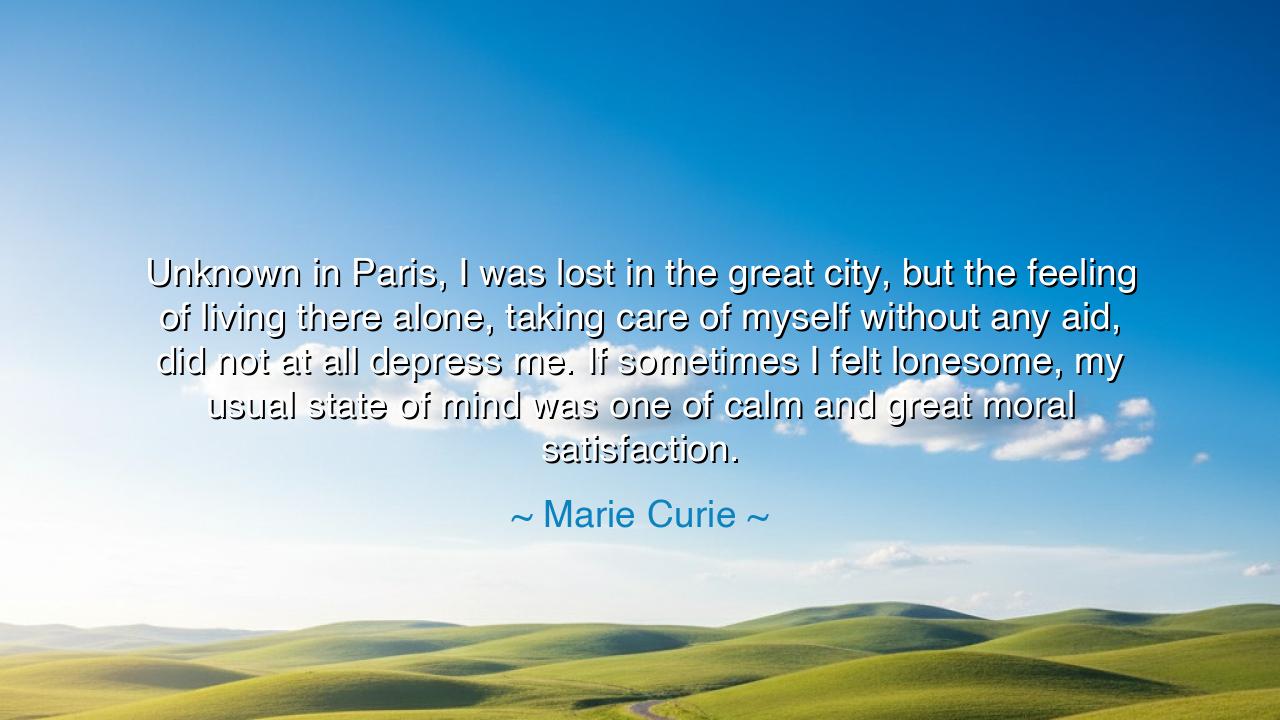
Unknown in Paris, I was lost in the great city, but the feeling
Unknown in Paris, I was lost in the great city, but the feeling of living there alone, taking care of myself without any aid, did not at all depress me. If sometimes I felt lonesome, my usual state of mind was one of calm and great moral satisfaction.






In the serene and courageous words of Marie Curie, we hear the quiet music of perseverance and solitude: “Unknown in Paris, I was lost in the great city, but the feeling of living there alone, taking care of myself without any aid, did not at all depress me. If sometimes I felt lonesome, my usual state of mind was one of calm and great moral satisfaction.” These words, born from the heart of a young woman far from home, reveal the strength of the soul when it learns to walk alone. They speak of the beauty of independence, the quiet dignity of self-reliance, and the profound peace that arises when one endures hardship not with despair, but with purpose.
The origin of this quote lies in the early life of Marie Curie — then Maria Skłodowska, a determined student who left her native Poland for France in pursuit of knowledge. Paris, the city of light, was not kind to her at first. She lived in a small attic, cold in the winter and bare of comfort, often surviving on bread, fruit, and tea. Yet, instead of yielding to sorrow, she embraced her solitude as a sacred discipline. Though she was unknown, and though the city around her moved in a rhythm that seemed to forget her, she found in her independence a quiet triumph. For Curie, to live alone and care for oneself was not misery — it was liberation. She had chosen her path, and in that choice she discovered a deeper form of joy: the moral satisfaction of perseverance.
The ancients would have recognized in her spirit the essence of stoic virtue. The philosopher Epictetus, once a slave, taught that freedom is not found in comfort, but in mastery of oneself. Likewise, Curie’s calm amid difficulty reflected an ancient truth: that to endure solitude with grace is to command one’s own destiny. Many fear being alone, believing solitude to be the twin of sadness. Yet for those who are guided by purpose, solitude becomes a forge — a place where weakness is burned away and the soul is tempered into strength. Curie’s peace was not born from ease, but from effort. She had found the rarest of treasures — contentment without dependence, serenity without applause.
Consider the story of Florence Nightingale, who, during the Crimean War, worked tirelessly in filthy, overcrowded hospitals, surrounded by suffering and death. Alone in the quiet hours of night, she wrote by candlelight, keeping careful notes and refusing despair. She, too, knew the same calm satisfaction that Curie described — the moral strength that comes from doing what must be done, even when no one sees. Both women, in different fields, found freedom not in being shielded from hardship, but in facing it with courage. Their solitude was not loneliness; it was the silence in which greatness is formed.
Curie’s words also teach us that loneliness and peace can coexist. She did not deny her moments of lonesomeness; she accepted them as part of the human condition. Yet those moments did not rule her. Beneath them flowed a deeper river of calm — the knowledge that she was building something greater than comfort: her future, her integrity, her soul. In this, she reveals a truth that all seekers must one day learn — that solitude, when embraced with purpose, becomes a sanctuary, not a prison. The one who can dwell content within themselves, even when unseen, has found a strength that no circumstance can destroy.
There is also in her words the echo of humility. Though she would one day become one of the most celebrated scientists in history — twice a Nobel laureate, the first woman to win — she spoke of her early struggles without pride or bitterness. Her satisfaction came not from recognition, but from the purity of her effort. She reminds us that the moral victory of living honestly and working diligently outweighs any external reward. In her solitude, she was already victorious, because she was true to her calling.
Therefore, my child, take this teaching to heart: do not fear the days when you must walk alone. Do not mistake solitude for failure, nor quiet labor for insignificance. The calm satisfaction that comes from perseverance is worth more than the fleeting comfort of ease. When the world does not see you, work still. When no one applauds, build still. For it is in these unseen hours that strength takes root and destiny begins to unfold.
So let Marie Curie’s words be your light: “The feeling of living there alone… did not depress me.” Remember that solitude is not emptiness, but potential — the place where dreams are refined and character is born. Stand firm in your purpose, take care of yourself with dignity, and find joy in your labor. For those who can find peace in solitude will one day bring light to others — just as Curie, in her quiet attic, was already preparing to illuminate the world.






AAdministratorAdministrator
Welcome, honored guests. Please leave a comment, we will respond soon